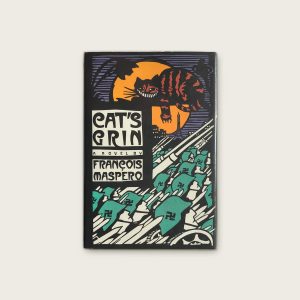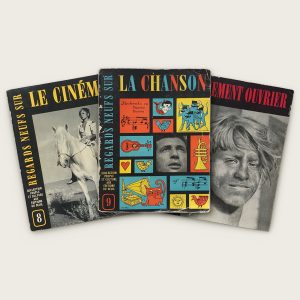[Chris Marker] La batalla de Chile: la lucha de un pueblo sin armas [inscribed]
By Patricio Guzmán
€225,00
Pamplona: Peralta Ediciones; Madrid: Editorial Ayuso, 1977. First edition. 12mo large (20×13,5cm), printed card wrappers. 232pp. Text in Spanish. Mild reading crease to the spine with minor edge-wear, and tiny tape leftovers on page 62, not effecting the text. Inscribed by Patricio Guzmán to Jorge Sánchez on the fly leaf. Near fine overall.
La Batalla de Chile: la lucha de un pueblo sin armas by Patricio Guzmán redefined the documentary genre in Chile and throughout Latin America, using film for political analysis rather than the mere denunciation that dominated political filmmaking at the time.
The film shows the class struggle in the streets in an unprecedented way. Shot between February and September 1973, it documents the political tensions in Chile and the violent counter-revolution by Augusto Pinochet, with the help of the Nixon administration, against the democratically elected government of Salvador Allende.
The backstory of the film is quite interesting: Guzmán had just finished his first feature-length documentary about the first twelve months of Salvador Allende’s government, entitled Primer año [The First Year] 1971, when Chris Marker knocked on his door in Santiago de Chile. Marker initially was interested to document the situation in Chile, but since Guzmán had already done so with Primer año, Marker asked if he could buy the film to show it in France. Guzmán agreed, and Marker left Chile with the 16 millimeter master of the film in his suitcase.
Marker added in agreement with Guzmán, a prologue to the film, which retraced the history of Chile and more particularly, the worker’s movement led by Allende, with a montage of black and white photographs by Raymond Depardon. He also got Yves Montand, Simone Signoret, François Périer, and Delphine Seyrig, as dubbing actors for the film. Primer año ended up winning the first prize at the Nantes festival and the FIPRESCI prize in Mannheim.
A year later at the end of 1972, the situation in Chile changed radically. The right had managed to create a sense of disorder in most of the cities of Chile. Seeing what was happening in the streets, Guzmán felt the need to make a documentary, even though the government had just banned the imports of a certain amount of products, including new film. In despair Guzmán wrote a letter to Marker, asking for his help. A month later approximately 13,200 meters (14 hours) of fresh film arrived at the airport of Santiago de Chile, and the crew around Guzmán could start filming.
La Batalla de Chile: La Lucha de un Pueblo Sin Armas contains the entire dialogue of the film with an introduction by the Chilean sociologist and Marxist intellectual Marta Harnecker, and the Cuban film director and screenwriter Julio García Espinosa.
It also includes the letter Patricio Guzmán sent to Chris Marker, outlining his ideas for the film, asking him for help in finding new film for the project. The book is inscribed and signed by Guzmán to Jorge Sánchez:
„Para Jorge Sanchez y el colectivo ZAFRA con todo afecto y confianza un saludo de Patricio – Habana-1979 – I Festival de Nuevo Cine Latinoamericano“
Jorge Sánchez founded the distribution company Zafra Cine y Difusión in 1979, which brought together an important archive of 16mm films of Latin American cinema and independent Mexican cinema. He was a founding member of the Mexican Association of Independent Producers (AMPI), the Iberoamerican Federation of Film and Audiovisual Producers (FIPCA) and Director of Guadalajara’s International Film Festival from 2005 through 2010. Between 2013 and 2018 he was general director of the Mexican Institute of Cinematography.
![[Chris Marker] La batalla de Chile: la lucha de un pueblo sin armas [inscribed]](https://chunkingbooks.com/wp-content/uploads/2021/04/batalla_01.jpg)
![[Chris Marker] La batalla de Chile: la lucha de un pueblo sin armas [inscribed] - Image 2](https://chunkingbooks.com/wp-content/uploads/2021/04/batalla_02.jpg)
![[Chris Marker] La batalla de Chile: la lucha de un pueblo sin armas [inscribed] - Image 3](https://chunkingbooks.com/wp-content/uploads/2021/04/batalla_03.jpg)
![[Chris Marker] La batalla de Chile: la lucha de un pueblo sin armas [inscribed] - Image 4](https://chunkingbooks.com/wp-content/uploads/2021/04/batalla_04.jpg)
![[Chris Marker] La batalla de Chile: la lucha de un pueblo sin armas [inscribed] - Image 5](https://chunkingbooks.com/wp-content/uploads/2021/04/batalla_05.jpg)
![[Chris Marker] La batalla de Chile: la lucha de un pueblo sin armas [inscribed] - Image 6](https://chunkingbooks.com/wp-content/uploads/2021/04/batalla_06.jpg)
![[Chris Marker] La batalla de Chile: la lucha de un pueblo sin armas [inscribed] - Image 7](https://chunkingbooks.com/wp-content/uploads/2021/04/batalla_07.jpg)



![[Chris Marker] Oasis: Fourth World - Semiotext(e)](https://chunkingbooks.com/wp-content/uploads/2021/04/oasis_01-300x300.jpg)